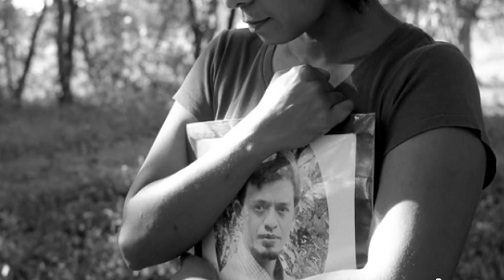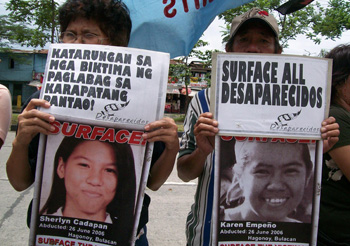
The Asian Federation Against Involuntary Disappearances or AFAD is requesting for a dialogue with the new president on the issue of forced disappearances.
Forced disappearance is an aberration because it defies the natural cycle of life which begins with birth and ends with death. Vanishing from the face of the earth is not normal.
But that’s what happened to many individuals in this world and in the Philippines the well-known names among them are peasant organizer Jonas Burgos, and UP students Sherlyn Cadapan and Karen Empeno.
The list is long, over a thousand names. Other names reported in media include Father Rudy Romano, a Redemptorist priest who served landless peasants and displaced settlers and the six workers of Paper Industries Corporation of the Philippines namely Joseph Belar, Jovencio Lagare, Romualdo Orcullo, Diosdado Oliver, Artemio Ayala Jr. and Arnold Dangkiasan. Others just disappeared without being noticed by media.
We have a law, the Anti-Enforced Disappearance Act of 2012 ( R.A 10353 ), signed by Aquino (at least he signed that legislation) which defines Enforced or involuntary disappearance as “ the arrest, detention, abduction or any other form of deprivation of liberty committed by agents of the State or by persons or groups of persons acting with the authorization, support or acquiescence of the State, followed by a refusal to acknowledge the deprivation of liberty or by concealment of the fate or whereabouts of the disappeared person, which places such person outside the protection of the law.”
The penalty for anybody found to have caused a person to disappear is life imprisonment.

“The UN Convention For the Protection of All Persons from Enforced Disappearance is a concrete legal measure which can be a powerful tool to help strengthen governments’ capacities to eradicate disappearances, punish the perpetrators and provide truth, justice, redress, reparation and historical memory to victims and their families,” Mary Aileen D. Bacalso, AFAD secretary general, said.
In their letter to the new president, AFAD said, “You have been vocal and consistent with your assertion that you are not part of the elite, and that you are one with the poor. We are glad to hear this and we believe that helping the poor is our point of unity. This is because out of the 1,774 cases of enforced disappearance in the country, a vast majority either come from very poor families, or were engaged in issues that aimed to uplift the lives of the poor. Some of these issues include the empowerment of farmers, self-determination of indigenous peoples, welfare of students, welfare of workers, and many other social issues that go beyond petty crimes. Perhaps the only sin these desaparecidos committed was to challenge the political forces that dominate their respective fields.”
Although Duterte was not involved in the issue of desaparecidos, a 2007 report by the Philip Alston, the United Nations Special Rapporteur on extrajudicial, summary or arbitrary executions implied his approval of extra-judicial killings by the Davao Death Squad, a vigilantes group.
AFAD said many of these desaparecidos have been missing for years and even decades. They urged Duterte to fully and strictly implement RA10353 and sign and ratify the International Convention for the Protection of All Persons from Enforced Disappearance.
“Today, as you prepare to settle into your new role, we hope you would keep in mind the plight of Jonas, Sherlyn, Karen, Father Rudy, and the hundreds of other desaparecidos who had the same vision for the country as you – a better life for poor Filipinos,” AFAD said.
AFAD is a federation composed of 14 organizations in 10 countries across Asia including two organizations based in the Philippines – Families of Victims of Involuntary Disappearance (FIND) and Free Jonas Burgos Movement (FJBM).
They work together in the search for desaparecidos (victims of state-perpetrated abductions) and the elimination of enforced disappearance which includes the struggle to find the truth, demand justice, reparation, reconstruction of historical memory, and institutionalizing guarantees of non-recurrence.
For those in the Philippines, their dream is a country without desaparecidos.
maybe it is too early to judge duterte on human rights but it seems to me this is not his priority since there are already reports on killings emanating from his statements on peace and order.